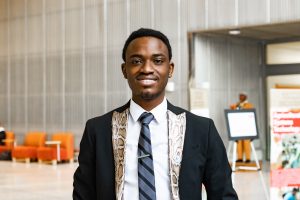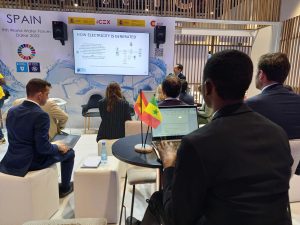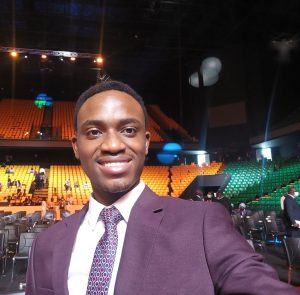ABE Student Oluwatuyi Olowoyeye Attends World Water Forum in Senegal
Author: Sarah Hays
Author: Sarah Hays
Organized once every three years, the World Water Forum is an event focusing on water quality and how to make progress on global water challenges.

From all around the world, participants are invited to the forum. Oluwatuyi Olowoyeye, doctorate student in Land and Water Resources Engineering in the Department of Agricultural and Biosystems Engineering here at Iowa State, was invited to attend this forum, hosted in Diamniadio, Senegal this year.
Olowoyeye applied for and received a Civil Society Sponsorship to fund his travel for this forum. The sponsorship covered his airfare, housing and accommodations for the event. The event was five days long – from Monday to Friday, March 21-26th, 2022.
With people from all around the world, there are many different topics to discuss with representatives from everywhere. This year’s topic was on the 2030 Agenda for Water Security for Peace and Development. One of Olowoyeye’s biggest takeaways from the event was the topic of urbanization and water resources, he said.
“The event is very diverse, targeted towards water but linked to many other things. One of the biggest things that I learned was about how we need to come up with strategies to manage water dynamics in urban areas,” Olowoyeye said. “Most developed countries have the challenge of rapid urbanization. As urbanization increases, the level of imperviousness increases and could potentially result in flood scenarios. We also learned about transboundary water management, which is a major challenge with the developing countries.”

Throughout the forum, Olowoyeye had many networking opportunities. One of his favorite parts was how the organization connected members into groups. Olowoyeye’s group consisted of young professionals like him.
“I was a part of a group that was all young people like me,” Olowoyeye said. “They brought young people together to discuss water-related challenges and voice your opinions.”

As Olowoyeye’s group shared their opinions, the organization presented a board, and people from all over the world could fill out a card with their water-related concerns and paste it on the board, and thoughts from those postcards were shared with decision-makers. The forum also presented ideas and solutions from specific countries and companies in the water space. Upon seeing that information, Olowoyeye says he noticed some of his education at Iowa State was applied to some of the topics, like the discussion on a planting project in the Sahel.
“I found some of my learnings here at Iowa State on water conservation being applied in some of the areas discussed, like the half-moon planting project in the Sahel, which typically looks like a pothole. Basically, they are building resilience against climate change and also to help restore vegetation on those desert lands,” Olowoyeye said. “I loved seeing everyone’s opinions because it shows how everyone cares about the ecosystems and the water system.”
The next World Water Forum will take place in 2024.